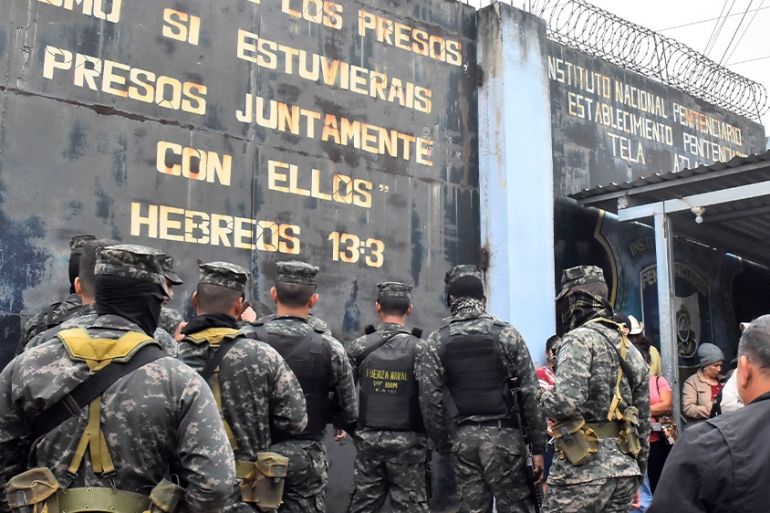At least 18 prisoners dead in Honduras jail riot
Country plagued by spiralling crime rate that is increasing migration among young people fearful of gang violence.

At least 18 inmates have been killed and 16 injured in overnight fighting between prisoners in Honduras‘ northern port town of Tela, prison officials have said.
The National Penitentiary Institute said on Saturday that 17 prisoners had died at the facility in Tela, about 200 kilometres (120 miles) from the capital Tegucigalpa, and one more died in hospital, with local media describing the unrest as gang violence.
Keep reading
list of 4 itemsMyanmar’s Aung San Suu Kyi moved to house arrest amid heatwave
‘Joyful but afraid’: Disabled Indian academic Saibaba’s family on acquittal
Gangs in Haiti break thousands of inmates out of prison
A prison spokesperson, Digna Aguilar, said authorities had to enter the area carefully “for fear of being among the victims” because several inmates had firearms, which slowed the investigation.
The combined national security force known as Fusina said that five nine-millimetre guns, as well as ammunition, had been seized from the inmates.
|
|
Prison officials had originally reported only three deaths, but the toll quickly rose.
Forensic workers placed the bodies in plastic bags and transported them to the judicial morgue of San Pedro Sula for autopsies.
An AFP photographer at the scene saw shocked relatives arriving to claim the bodies.
Honduran President Juan Orlando Hernandez, grappling with a recent wave of prison killings, on Tuesday ordered the army and the police to take full control of the country’s 27 prisons, which are badly overcrowded with some 21,000 inmates.
But as of Friday, the military had yet to take complete control of the Tela detention centre, according to Aguilar.
On Saturday, top military officer General Tito Livio Moreno indicated that the military would be deployed in 18 penal centres identified as “high risk”.
Wave of crime
Hernandez announced the crackdown after the killings on December 14 of five members of feared gang Mara Salvatrucha (MS-13) by a fellow detainee at the high-security prison in La Tolva, 40km (25 miles) east of Tegucigalpa.
That came just a day after Pedro Idelfonso Armas, the warden of El Pozo – the country’s main high-security prison, in the western city of Santa Barbara – was shot dead in the south of the country.

The Ministry of Security had suspended Armas shortly before that amid an investigation into his presence during the October 26 killing by prisoners of Magdaleno Meza, a drug kingpin whose confession and notebooks linked him to a brother of the president, Juan Antonio “Tony” Hernandez.
Meza’s account books were entered as evidence in the New York trial of Hernandez, who was subsequently convicted on four counts of drug trafficking. He faces sentencing – possibly for life – in January.
President Hernandez condemned the conviction of his younger brother, saying it was based on “the testimony of confessed assassins”.
|
|
A video circulating on social media shows the 52-year-old Armas talking with Meza when prison guards opened a locked gate, allowing a dozen inmates to burst in and stab, shoot and kill the drug trafficker.
In addition, a lawyer who had represented Meza and other members of the Valle Valle drug cartel, Jose Luis Pinto, was killed in an attack December 9 in a town northwest of Tegucigalpa. That killing remains under investigation.
Honduras has been plagued by drug trafficking, gangs, poverty and corruption.
It suffers from one of the highest murder rates in the world outside areas of armed conflict, having registered 41.2 homicides per 100,000 inhabitants in 2018.
President Hernandez created a military police force financed by a new tax and built special prisons for gang members to tackle the problem.
The high crime rate has been a key factor behind a wave of migration towards the United States, particularly by children who say they fear being forced into gangs.